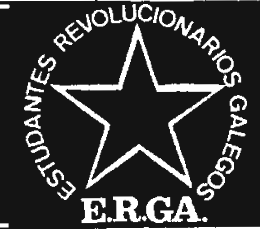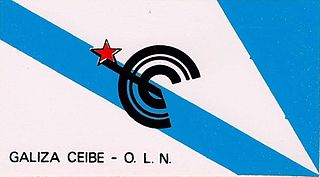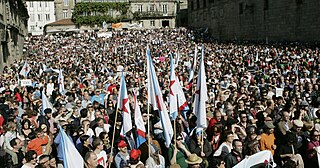
The Galician Nationalist Bloc is a political coalition of left-wing Galician nationalist parties. It is self-defined as a "patriotic front".

Alfonso Daniel Rodríguez Castelao, commonly known as Castelao, was a Galician politician, writer, painter and doctor. He is one of the fathers of Galician nationalism, promoting Galician identity and culture, and was one of the main names behind the cultural movement Xeración Nós. He was also one of the founders and president of the Galicianist Party.

Ricardo Carvalho Calero was a Spanish philologist, academic and writer. He was the first Professor of Galician Language and Literature at the University of Santiago de Compostela. He was one of the main theorists of contemporary Galician reintegrationism and his works on this field are considered a primary reference. Many consider Carvalho Calero as one of the most prominent figures of the twentieth century Galician intelligentsia.

Galician Revolutionary Students was a leftwing nationalist students organization in Galicia, Spain. ERGA functioned as the students wing of the Galician People's Union (UPG). ERGA was founded in 1972. ERGA published a monthly, Lume. ERGA was the first mass organization of nationalism after the civil war, got a broad presence in the universities and high schools of Galiza and formed future UPG leaders and militants.
Reintegrationism is the linguistic and cultural movement in Galicia which advocates for the unity of Galician and Portuguese as a single language. In other words, it postulates that Galician and Portuguese languages did not only share a common origin and literary tradition, but that they are in fact variants of the same language today. According to this, Galicia should re-integrate into the Community of Portuguese Language Countries.

Galician nationalism is a form of nationalism found mostly in Galicia, which asserts that Galicians are a nation and that promotes the cultural unity of Galicians. The political movement referred to as modern Galician nationalism was born at the beginning of the twentieth century from the idea of Galicianism.
The Galician Language Association is a reintegrationist association established in 1981 which seeks the full restoration ("re-integration") of Galician as a branch of Galician-Portuguese. It also aims for the official incorporation of Galicia into the Community of Portuguese Language Countries. It was originally formed by professional linguists only, although membership was soon made available to individuals showing an interest in the promotion of Galician culture, language, and the ideas of linguistic reintegrationism.

Galiza Ceibe-OLN was an independentist and socialist political party in Galicia, Spain. Galiza Ceibe was founded on 1980 by the Galician Party of the Proletariat as a political and electoral front, originally to present a list in Vigo and in other galician municipalities under the name Agrupación Electoral Galicia Ceibe in the 1979 local elections.
The Assembly of the United People (APU) was a Galician political organization, with an independentist, socialist and feminist ideology. It was formed in 1989 from a split of the first Galician People's Front, and disappeared with its self-dissolution in 1995.

Isca! is the name of a Galician youth organization that promotes Galician independence, combined with anti-capitalist and feminist ideology. They are linked to the Galician Movement for Socialism, a socialist and pro-independence party that forms part of the Galician Nationalist Bloc (BNG).
The Galician National-Popular Assembly was suprapartisan umbrella organization established in 1975 created to coordinate various political fronts of the left-wing Galician nationalist movement.
AGIR is an organization of students with a Galician independentist and anticapitalist ideology. It's an organization that has presence in different comarcas of Galiza and is made up only of active students.
The Galician Socialist Party was a socialist and Galician nationalist political party active in Galicia.
The Galician People's Assembly was a political organization founded on October 10, 1976 by a splinter group of the Galician National-Popular Assembly. The APG considered AN-PG to close to the Galician People's Union. Its leaders were Xan López Facal, César Portela, Carlos Vázquez and Mario López Rico. The organization held its first congress in December 1976. The APG supported the Galician Socialist Party, a splinter of the agrarian union Comisións Labregas, called Comisións Labregas Terra and the Comités de Traballadores Galegos. The APG participated in the launching of the magazine Teima (1976-1977). The APG ceased to exist on December 4, 1977; that same year part of his membership helped to found the Galician Workers Party (POG).
Comités Abertos de Faculdade was a student organization of Galiza. Formed from the union of different faculty assemblies. The main goals of the CAF were defending quality and the Galician language public education. It was an assembly-based organization. The CAF were considered the heirs of the ERGA.

Galician Socialist Youth, was a youth political organization founded on April 25, 2009 in the city of Santiago de Compostela, that acted as the youth of the Galician Socialist Space. The organization self-dissolved and transformed itself in the Galician Nationalist Youth (MNG) in November 2010.

The Galician independence movement or the Galician separatist movent is a political movement, derived from Galician nationalism, which supports the independence of Galicia and Galicia estremeira or the unification with Portugal.

Sindicato Labrego Galego-Comisións Labregas is a Galician farmers and breeders union centered on family farms and small peasants.
The Galician Rural Federation is a Galician farmers and breeders union centered on family farms and small peasants. The organization has its origins in a split of the Sindicato Labrego Galego-Comisións Labregas (SLG) in 2009. The splitters, that later founded FRUGA, wanted the SLG to take a closer political line to the Galician Nationalist Bloc and the Galician People's Union. FRUGA is particularly strong among milk cows small farmers.

Queremos Galego or Plataforma Queremos Galego! is a citizen platform and social movement, consisting of 600 entities from different areas and by people individually, that was born in 2009 to articulate a collective response in defense of the Galician language, its public use and the linguistic rights of the Galician-speaking population. The main actions of the platform are demonstrations and public acts. The current main goal of Queremos Galego is to fight against the linguistic policy of the People's Party of Galicia.










